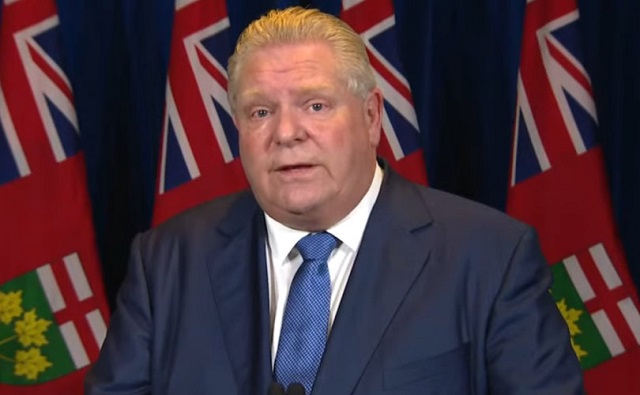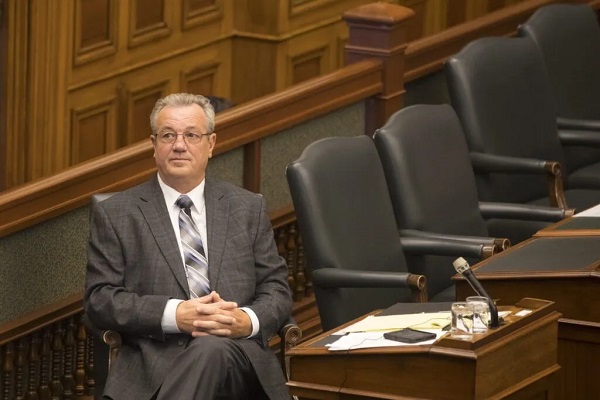Business
Instead of competing, Ontario’s Ford plans to spend billions to stimulate growth

From the Fraser Institute
By Jake Fuss and Grady Munro
Premier Doug Ford, who will trigger an election this week, recently said he plans to “spend billions of dollars” to stimulate Ontario’s economy if President Donald Trump makes good on his threat to slap a 25 per cent tariff on Canadian exports into the United States.
But rather than piling on even more spending, the next Ontario government—whoever that may be—should enact policies that finally get provincial finances back in order and make Ontario an attractive place to work and invest.
Relief can’t come soon enough. The Ford government has woefully mismanaged provincial finances. When first elected in 2018, Premier Ford promised to balance the budget and reduce government debt—something Ford’s former finance minister Vic Fedeli described as a “moral” imperative. Yet since then, the government has run deficits in five of six years and its net debt burden has increased by an estimated $70.3 billion.
As a result, in 2023 Ontario had the second-highest debt burden of any province (only Newfoundland and Labrador had a larger burden) when measured on a per-person basis.
Based on the Ford government’s latest fiscal update, the reckless mismanagement has continued into this fiscal year (2024/25). Despite enjoying lower-than-expected debt interest costs and higher-than-expected revenues—which combined could have nearly eliminated the budget deficit—the Ford government instead chose to again increase spending and keep running deficits.
Why should Ontarians care?
Because the Ford government’s penchant for spending and borrowing is hurting Ontario’s economy. When the government runs a deficit and accumulates more debt, it competes with individuals, households and businesses for borrowing. This drives up interest rates (i.e. the cost of borrowing) for everyone, which can reduce the level of investment in the economy. Moreover, because rising debt and higher interest rates equal higher interest payments, the government faces pressure to raise taxes. And the brunt of the new tax burden will fall on younger generations of Ontarians.
Also this week, Premier Ford said President Trump “wants to attract businesses from Ontario to come down to the United States,” which will eliminate jobs in the province.
And Ford’s right. When policymakers create the conditions to attract people and investment, their economies grow and people prosper.
If the Ontario government wants to beat Trump at his own game, it should lower personal income taxes and make the province a more attractive destination for high-skilled workers such as engineers and entrepreneurs who contribute greatly to the economy and create jobs. Lower taxes also improve the incentive for individuals to engage in productive activities such as working, saving and investing. In 2023, Ontario had the third-highest top combined (provincial and federal) personal income tax rate in Canada and the U.S.
The government should also lower business taxes to make Ontario more competitive with the U.S. in attracting businesses and investment—the pillars of job-creation and prosperity.
Regardless of who wins the election, the next Ontario government should finally restore some semblance of fiscal responsibility and balance the budget. And it should lower taxes for workers and businesses to help create prosperity across the province. That’s a much more sensible and sustainable way to counter threats from Trump (or anyone else) than spending billions of dollars borrowed on the backs of Ontarians.
Internet
US government gave $22 million to nonprofit teaching teens about sex toys: report

From LifeSiteNews
The Center for Innovative Public Health Research’s website suggests teenage girls make their ‘own decisions’ about sex and not let their parents know if they don’t want to.
For almost a decade, the U.S. government funded a group that actively works to teach kids how to use sex toys and then keep them hidden from their parents to the tune of $22 million.
According to investigative reporter Hannah Grossman at the Manhattan Institute, The Center for Innovative Public Health Research (CIPHR) has been educating minors about sex toys with public funds.
Records show that the millions given to the group since 2016, according to its website, go toward “health education programs” that “promote positive human development.”
However, the actual contents of the programs, as can be seen from comments from CIPHR CEO Michele Ybarra, seem to suggest that its idea of “human” development is skewed toward radical sex education doctrine.
In 2017, CIPHR launched Girl2Girl, which is funded by federal money to promote “sex-ed program just for teen girls who are into girls.” Its website lets users, who are girls between ages 14 and 16, sign up for “daily text messages … about things like sex with girls and boys.”
The actual content of some of the messages is very concerning. Its website notes that some of the texts talk about “lube and sex toys” as well as “the different types of sex and ways to increase pleasure.”
The website actively calls upon teenage girls to make their “own decisions” and not let their parents know if they don’t want to.
Grossman shared a video clip on X of Ybarra explaining how they educate minors about the use of “sex toys” and dealing with their parents if they are found out.
The clip, from a 2022 Brown University webinar, shows Ybarra telling researchers how to prepare “young person(s)” for her research.
She said if they are doing “focus groups,” she will ask them, “Okay, so what happens if somebody comes into the room and sees words like penis and sex toys on your screen — on your computer screen or on your phone? What if it’s your mom?’”
In 2023, CIPHR launched Transcendent Health, which is a sex-education program for minors who are gender confused. This initiative received $1.3 million of federal grant money that expired last month.
Grossman observed that the federal government “should not fund programs that send sexually explicit messages to minors and encourage them to conceal these communications from parents.”
She noted that in order to protect children and “prevent further harm,” U.S. President Donald Trump’s Department of Health and Human Services “should immediately cancel CIPHR’s active contract and deny its future grant applications.”
“By doing so, the Trump administration can send a clear message: Taxpayers will no longer foot the bill for perverted ‘research’ projects,” she noted.
The Trump administration has thus far, through the Department of Government Efficiency (DOGE), exposed billions in government waste and fraud. Many such uses of taxpayer dollars are currently under review by the administration, including pro-abortion and pro-censorship activity through USAID, “Diversity, Equity, and Inclusion and neo-Marxist class warfare propaganda” through the National Science Foundation, and billions to left-wing “green energy” nonprofits through the Environmental Protection Agency.
Business
Canadian Police Raid Sophisticated Vancouver Fentanyl Labs, But Insist Millions of Pills Not Destined for U.S.

 Sam Cooper
Sam Cooper
Mounties say labs outfitted with high-grade chemistry equipment and a trained chemist reveal transnational crime groups are advancing in technical sophistication and drug production capacity
Amid a growing trade war between Washington and Beijing, Canada—targeted alongside Mexico and China for special tariffs related to Chinese fentanyl supply chains—has dismantled a sophisticated network of fentanyl labs across British Columbia and arrested an academic lab chemist, the RCMP said Thursday.
At a press conference in Vancouver, senior investigators stood behind seized lab equipment and fentanyl supplies, telling reporters the operation had prevented millions of potentially lethal pills from reaching the streets.
“This interdiction has prevented several million potentially lethal doses of fentanyl from being produced and distributed across Canada,” said Cpl. Arash Seyed. But the presence of commercial-grade laboratory equipment at each of the sites—paired with the arrest of a suspect believed to have formal training in chemistry—signals an evolution in the capabilities of organized crime networks, with “progressively enhanced scientific and technical expertise among transnational organized crime groups involved in the production and distribution of illicit drugs,” Seyed added.
This investigation is ongoing, while the seized drugs, precursor chemicals, and other evidence continue to be processed, police said.
Recent Canadian data confirms the country has become an exporter of fentanyl, and experts identify British Columbia as the epicenter of clandestine labs supplied by Chinese precursors and linked to Mexican cartel distributors upstream.
In a statement that appears politically responsive to the evolving Trump trade threats, Assistant Commissioner David Teboul said, “There continues to be no evidence, in this case and others, that these labs are producing fentanyl for exportation into the United States.”
In late March, during coordinated raids across the suburban municipalities of Pitt Meadows, Mission, Aldergrove, Langley, and Richmond, investigators took down three clandestine fentanyl production sites.
The labs were described by the RCMP as “equipped with specialized chemical processing equipment often found in academic and professional research facilities.” Photos released by authorities show stainless steel reaction vessels, industrial filters, and what appear to be commercial-scale tablet presses and drying trays—pointing to mass production capabilities.
The takedown comes as Canada finds itself in the crosshairs of intensifying geopolitical tension.
Fentanyl remains the leading cause of drug-related deaths in Canada, with toxic supply chains increasingly linked to hybrid transnational networks involving Chinese chemical brokers and domestic Canadian producers.
RCMP said the sprawling B.C. lab probe was launched in the summer of 2023, with teams initiating an investigation into the importation of unregulated chemicals and commercial laboratory equipment that could be used for synthesizing illicit drugs including fentanyl, MDMA, and GHB.
The Bureau is a reader-supported publication.
To receive new posts and support my work, consider becoming a free or paid subscriber.
Invite your friends and earn rewards
-

 Also Interesting2 days ago
Also Interesting2 days agoMortgage Mayhem: How Rising Interest Rates Are Squeezing Alberta Homeowners
-

 Alberta2 days ago
Alberta2 days agoAlberta takes big step towards shorter wait times and higher quality health care
-

 Justice2 days ago
Justice2 days agoCanadian government sued for forcing women to share spaces with ‘transgender’ male prisoners
-

 Business1 day ago
Business1 day agoStocks soar after Trump suspends tariffs
-

 COVID-191 day ago
COVID-191 day agoBiden Admin concealed report on earliest COVID cases from 2019
-

 MAiD2 days ago
MAiD2 days agoDisability rights panel calls out Canada, US states pushing euthanasia on sick patients
-

 Business2 days ago
Business2 days agoTrump raises China tariffs to 125%, announces 90-day pause for countries who’ve reached out to negotiate
-

 COVID-192 days ago
COVID-192 days agoRandy Hillier wins appeal in Charter challenge to Covid lockdowns







